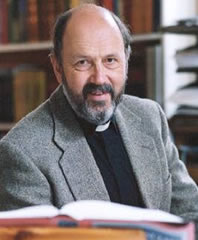Top Christian theologian slams Cameron for Europe referendum

Leading theologian NT Wright has criticised the British Prime Minister for calling a referendum on Europe.
Professor Tom Wright told Christian Today that he wished David Cameron had not decided on this tactic.
He said: "The Scottish Referendum has settled nothing, but rather stirred up all kinds of feelings and antagonisms, and I fear this one will do the same. We have a Parliamentary democracy and, creaky old system though that is, we ought not to try so readily to bypass it."
Wright, who holds the chair in New Testament and Early Christianity at the University of St Andrews in Scotland and is also a former Bishop of Durham, warned against applying apocalyptic Bible texts such the Book of Daniel to the Brexit debate.
Until the late 17th century, the Bible, especially the Old Testament, was taught in seminaries and colleges as the essential guide to all things political.
"The sad truth is that most modern Western Christians have not been taught at all the basic rudiments of a Christian political theology," Wright said.
"Various attempts have been made, but most folk are blissfully unaware that there is anything much to be said."
From a Jewish and Christian biblical point of view, there are two basic things for people to remember, he advised. These should be the starting-points for any Christian trying to work out what to vote on June 23.
"God wants humans to govern his world and he wants them to do so wisely and with special regard for the poor and needy," said Wright.
Secondly, God will hold rulers and magistrates to account for the discharge of this responsibility. "In other words, neither anarchy nor tyranny."
From early days the Church, fuelled by passages like John 16, saw it as part of the Spirit-led Christian responsibility to speak the truth to power, both in the sense of underlining the truth, and articulating it.
"Since the Enlightenment the media, especially the newspapers, have tried to take on elements of those roles, which is why they have wanted to keep the Church off the patch and insist that Christians should concentrate on saving souls instead," Wright explained. This was "all part of the Enlightenment's split-level world which is now shown up on all sides to be morally and socially bankrupt but still dominates the horizon".
Beyond that, there are pragmatic issues such as how the present institutions have served Britain and the wider world, and what "words of judgment" people might want to say to these institutions.
"In addressing these we would need to take account of the fact that the EU as it now is emerged from a mood in post-war Europe when everything was being lumped together into large units – like our unlamented nationalised industries. That was high modernism: make everything part of the one big machine.
"But postmodernism has struck back, insisting on the 'little stories', the local identities and so on, and encouraging people, groups, regions and countries to rediscover their true identity and with it their freedom.
"So the debate we are now starting to have maps on to that larger cultural to-and-fro and we won't understand the subterranean dynamics unless we recognise that. This is then reflected in Church debates, eg the 'unity vs freedom' appearance in some Anglican discussions."
He said there was no specifically Christian "in or out" answer on Europe, but people should be alert to the motives of people making their arguments.
He will address these and other issues in his new book, God in Public, due to be published this year by SPCK.











